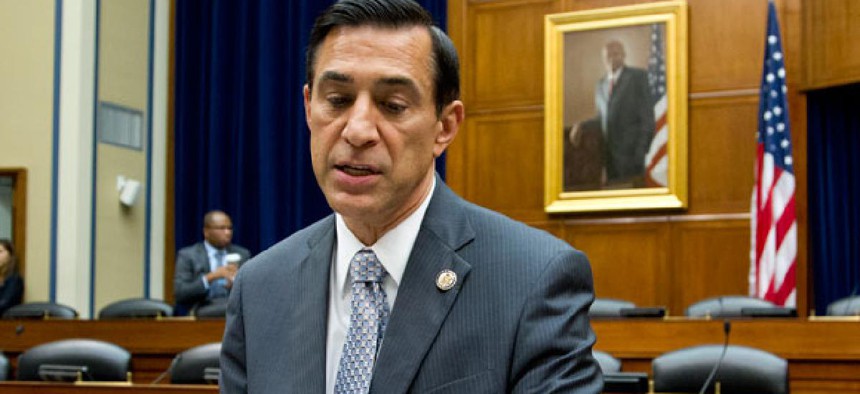
Rep. Darrell Issa, R-Calif. Manuel Balce Ceneta/AP
Lawmaker seeks more frequent alerts from inspectors general
Issa cites delay in informing Congress of last year’s probe of GSA’s lavish conference.
Inspectors general should keep Congress better informed about ongoing investigations of possible misconduct at agencies in the view of Rep. Darrell Issa, R-Calif., chairman of the House Oversight and Government Reform Committee.
As first reported by The Washington Post, Issa on Aug. 3 sent a letter to 73 inspectors general complaining that the IG for the General Services Administration, Brian Miller, had been probing overspending at an October 2010 GSA training conference in Las Vegas for nearly a year before the story became public in April 2012. Agency leaders and the IG knew of the pending probe, but “Congress remained in the dark,” Issa wrote.
Issa asserted that a major tool given to IGs for reporting to Congress, the seven-day letter, is being neglected. He asked the IGs to report on whether they had issued any seven-day letters since January 2009, and if, so, under what circumstances. He also asked the IGs whether they had conducted any investigations not reported to Congress.
Seven-day letters are rarely used, according to a 2011 study by the Government Accountability Office, because problems with agency operations often are resolved informally without the need for such a letter. But Issa is asking the IGs in cases involving serious national security issues to notify congressional committee chairs and their ranking members, in an arrangement like the one executive branch intelligence officials use to keep a select group of congressional intelligence leaders informed.
“Going forward,” Issa wrote to all the IGs, “it is my expectation that you will inform Congress about serious or flagrant problems at your agency -- like those at GSA -- much earlier.”
Sarah Breen, a spokeswoman for the GSA IG’s office, in a statement emailed to Government Executive, said, "We are working with Congress and other inspectors general to make sure that Congress receives timely and appropriate notification of significant issues."
A spokesman for the inspectors general council said the joint body would have no comment because Issa’s letter was sent to the entire IG community.
Donald Kettl, dean of the School of Public Policy at the University of Maryland, cautioned that while “full and transparent investigation is critical to good oversight . . . investigators deserve a chance for a careful quiet look before suspicions go public. If an allegation turns out to be unfounded, it would be unfair to drag managers through a publicity storm. And if all allegations are made public before being proved, it would create huge incentives to make allegations to embarrass agencies into political submission, and that wouldn't be good for anyone. Due process requires due care,” he added.
Issa’s approach drew backing from Paul C. Light, a professor of public service at New York University, who recommends legislation to clarify the circumstances under which a detailed seven-day letter is merited. “A seven-day letter cannot reveal the nature of an ongoing investigation that might lead to criminal action,” Light said, “but it most certainly can cover a major breach in operations, implementation and vulnerability, as well as IG concerns regarding the impact of pending legislation on economy and efficiency.”







